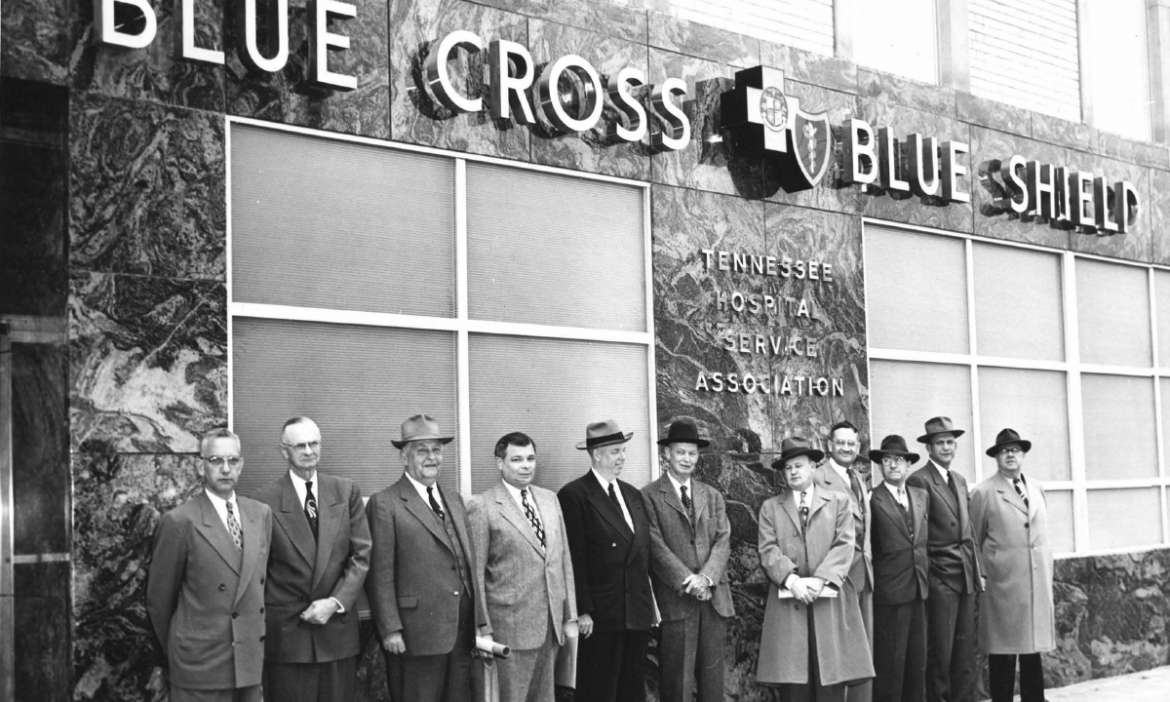When you spend money with a business, you want to feel like you matter more than their ability to make money, even though you know that’s necessary, too. The desire is even stronger when you’re buying a product or service that’s essential to your wellbeing.
It’s probably why people sometimes have strong feelings when health care and finances collide.
We understand because we’ve been offering Tennesseans health coverage and financial security for close to 75 years.
Our members want to know we’re stable enough to meet their needs — today and tomorrow — but they may not understand how our unique status as a taxpaying, not-for-profit company affects the way we operate each day. So I’ll explain.
A history of service
We trace our company’s roots to 1945, when Roy McDonald of Chattanooga created the Tennessee Hospital Service Association (see photo above) to provide peace of mind for residents by helping them pay for hospital services.
Today we serve 3.5 million people in Tennessee and around the country. Our mission is “peace of mind through better health,” and our core business is providing affordable access to quality health care.
Motivated by our members, not by profits
BlueCross is a taxpaying, not-for-profit company focused on serving Tennesseans.That makes us different than:
- A for-profit company, which has a responsibility to maximize profits for its owners
- A nonprofit organization, which exists for charitable purposes and usually doesn’t pay taxes
One of our primary roles is advocating for lower costs on behalf of our members. We do that first by negotiating discounted prices with health care providers, which we pass on to our customers.
Let’s say we work to lower the price of a medical treatment from $100 to $70. That means we have to collect less in premiums to cover what we’re responsible for, and the member has a lower amount to cover out of their own pocket.
We don’t have shareholders or private owners that profit from our business operations, so we can target and earn lower amounts than our for-profit competitors.
(We typically aim for 3-5 percent of gross revenues each year.) That in turn makes it easier for us to keep our focus on the needs of our members.
However, we still have to earn a modest profit each year to protect our long-term ability to serve our customers. Markets are unpredictable, and it wouldn’t be wise to plan on just breaking even.
Over the past four years, our average net income has been 1.3% of our annual gross revenues.
In 2016, we spent 87 cents from each premium dollar on direct medical care for our members. We paid out another 4 cents to cover our local, state and federal taxes.
But that remaining 9 cents still adds up, so we have a responsibility to carefully manage administrative expenses, which are the costs of doing business. And we do – we’re consistently ranked by the Blue Cross Blue Shield Association as one of the most efficient among their 36 member companies across the country.
Our strength ensures your security
Each year, any net income we earn goes into our reserve fund. In fact, we’re required by the State of Tennessee to maintain a certain level of reserves based on how many members we have and how much we have to charge in premiums. So we have to build margin into our pricing.
Our status as a not-for-profit actually makes maintaining healthy reserves even more important than it might be for other companies.
Those funds are critical for a number of reasons, like being prepared for the possibility of an epidemic disease or natural disaster that leads to a large, unexpected level of health care claims.
Reserves are also important if we have a down year – which can happen at any time due to the uncertainty of the market and the cyclical nature of business.
Finally, we aren’t on the stock market and don’t have the same ability to raise money in the capital markets that publicly traded companies do. There’s no BlueCross stock to issue if we need to raise money to cover big, unexpected expenses or make new investments.
Looking beyond the next quarter
Our not-for-profit status also allows us to take a long-term view in our decision-making. We aren’t bound to the quarterly cycle of financial reporting and expectations that can sometimes lead to short-sighted strategies. We aren’t chasing quarterly revenue and profit goals, with a corresponding need to consistently reach higher targets.
Taking a long-term view means we can make choices some companies might not, like moving strongly into the ACA Marketplace when it launched in 2014 – and remaining in more areas of the state than anyone else. It also means we can invest in changing the way we pay providers because it’s essential to the long-term financial health of the people we serve.
BlueCross has been right here in Tennessee for nearly 75 years, and our goal is to continue serving our neighbors for decades to come. We make business and financial decisions with those people, and that mission, in mind.


 Scott is responsible for day-to-day management and operation of the state’s largest health insurer. He takes an active role in developing the long-range goals, plans and objectives of the organization, and leads operations teams including customer service, claims, clinical staff, provider networks, marketing, and information systems.
Scott is responsible for day-to-day management and operation of the state’s largest health insurer. He takes an active role in developing the long-range goals, plans and objectives of the organization, and leads operations teams including customer service, claims, clinical staff, provider networks, marketing, and information systems.